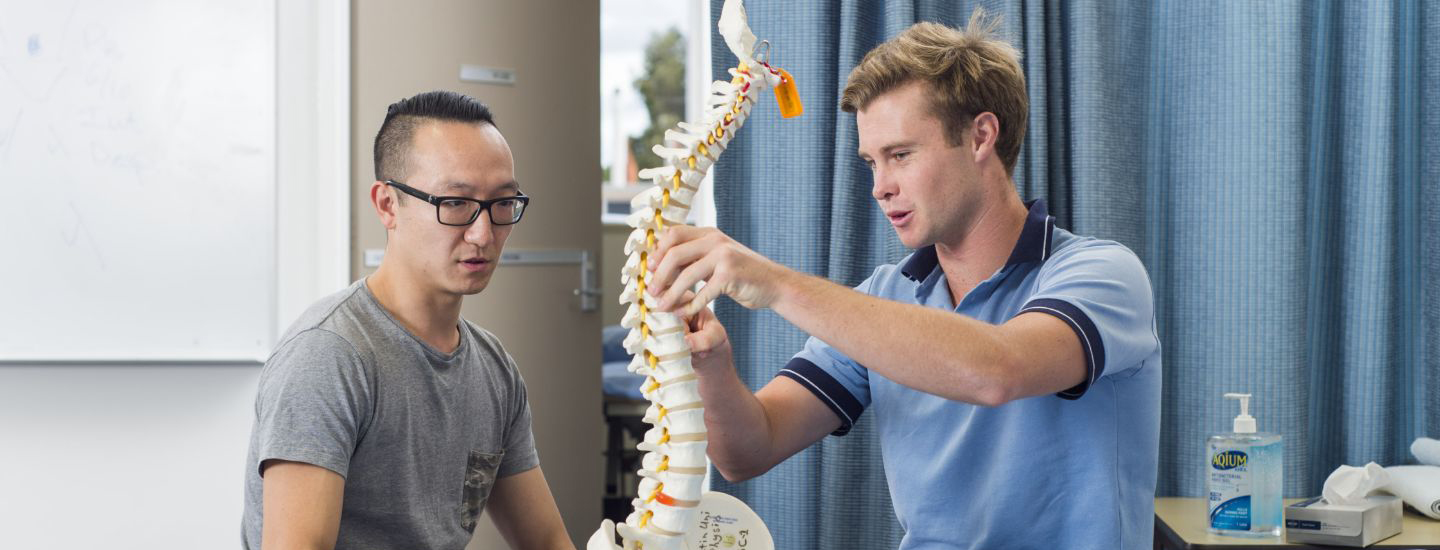CRICOS Code 087942A
Students must complete the following core units and one elective with a Course Weighted Average of 65%.

Stage 1: 2-3 Trimesters (8-12 months)
Stage 2: 2 Semesters (12 months)
Curtin Bentley
Course not available to Australian students
Stage 1 = $28,900 ($3,612.50 per unit)
Stage 2 = $41,900 ($5,237.50 per unit)
Additional costs may apply depending on your course and stream
(Available to International students only)
As an occupational therapist you will work with people of all ages who may have experienced injury, illness or disability. You can help people to engage in occupations or activities that are meaningful to them and achieve independence, better health, wellbeing and satisfaction in their lives.
In this course you will learn to identify physical, psychosocial, cognitive, behavioural and environmental factors that can help or hinder a person’s participation in everyday activities. You’ll learn to collaborate with other health professionals to provide cross-discipline care that is focused around the client and their needs.
You will study in laboratories, learning spaces and resource rooms that are tailored for learning the skills required to work in occupational therapy.
Students need to complete a one week clinical fieldwork placement prior to the commencement of the unit OCCT2003 Introduction to OT Professional Practice in Semester One. Students will be allocated to their one week placement at the start of the year and in 2024 should be available from the 8th January.
Click here to see Curtin University inherent requirements.
Bachelor of Science (Occupational Therapy)
Students must complete the following core units and one elective with a Course Weighted Average of 65%.
Students must complete the following core units with a Course Weighted Average of 65% and not fail any Stage 2 units.
Semester 1
| Code | Title |
|---|---|
| FPHP1000 | Foundations for Professional Health Practice |
| HSF1000 | Human Structure and Function |
| IPSY1000 | Introduction to Psychology |
| IOT1001S* | Introduction to Occupational Therapy * |
Semester 2
| Code | Title |
|---|---|
| ICHB1006 | Indigenous Cultures and Health Behaviours |
| EIHP1001 | Evidence Informed Health Practice |
| FA1002 | Functional Anatomy |
| COT1000S* | Concepts in Occupational Therapy Practice* |
*Service Taught Units are units where Curtin College students join Curtin University students in the same classroom. Such units are taught by university staff and Curtin College students will be enrolled as Curtin University students. Curtin University Policies and Processes will apply to these units.
Stage 2 Units – 25 Credit Points Each
The role of empirical evidence in making decisions in health practice. Introduction to different types of research methodologies; measurement; observation; data collection; research ethics; bio-statistical analysis; strategies to understand, question and evaluate evidence.
Introduction to ethical decision making in the context of professional health practice. Application of academic standards and development of skills required for studying at university. Introduction to professional requirements which impact on the safety and quality of client centred service/care when working in a health setting. Examination of differences in Australian and international health systems. Students will learn the value of diversity in inter-professional practice through working in teams. Students will reflect on their learning and begin to develop lifelong learning skills.
Anatomical organisation of the body and the relationships between body systems and cells. Human requirements for metabolism and life. The structure and function of the body. Basic control and interactions of the circulatory, respiratory, digestive and excretory systems. Primary defence against microorganisms. Mechanisms for growth, repair and reproduction.
In this unit students will examine culture and diversity within local, national and global, Indigenous populations; impacts of specific policies and historical events on Indigenous Australians and their effects on health and health care access. Students will analyse health outcomes of Indigenous Australians and explore underlying social determinants, and how health professionals can work collaboratively in consultation with Indigenous individuals, families, communities and organisations.
Broad outline of the nature, methods, and fields of psychology. Introduction to psychology and methodological issues related to the study of human beings and the relevance of both for interactions with individuals and groups. Introduction to social psychology, personality, development, learning, memory, and motivation.
Development of occupational therapy. Introduction to foundational knowledge, skills, and attitudes required to be an occupational therapist. Introduction to the occupational therapy process. Understanding of occupational analysis. Application of professional behaviour, interpersonal communication and ethics through a variety of practical and fieldwork experiences.
Development of foundation competencies in understanding neuromusculoskeletal anatomy of the trunk, upper and lower limbs as a basis to understanding normal human movement.
Introduction to the occupational perspective of humans and health. Consideration of occupation – human activity which is purposeful, meaningful and active- as the way humans form individual and collective identities, realise a meaningful existence, and ultimately achieve and maintain health. Frameworks used to understand humans as occupational beings. Consider contemporary issues impacting on occupational health.